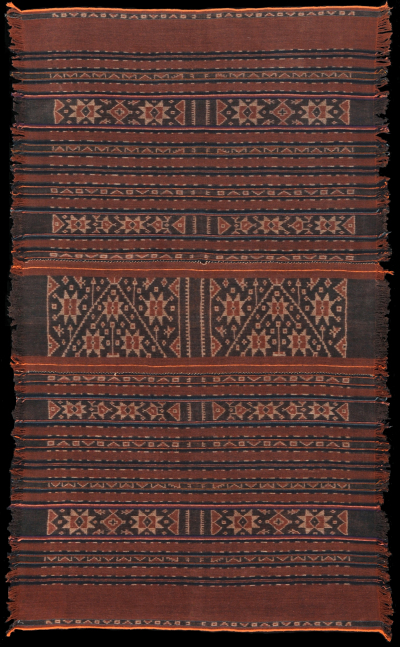| |
126 Solor Archipelago, Lembata
Kewatek (sarong)  
|
| Locale: | Lamalera, whalers community, or Atadei. Lamaholot people. |
| Period: | Late 19th to early 20th c. |
| Yarn: | Cotton, hand-spun, coarse |
| Technique: | Warp ikat |
| Panels: | 3 |
| Size: | 114 x 180 cm (3' 8" x 5' 10") LW: 1.58 |
| Weight: | 945 g (33.3 oz), 461 g/m2 (1.51 oz/ft2) |
| Design: | Petak haren nai telo, three panel bridewealth sarong. Midfield decorated with a motif that in Lamalera is interpreted as whalers' rowing/sailing prahus peledang, with long oars. Actually it is probably an ancient ship motif that has nothing to do with whaling but is related to migration. Bands with sting rays, moku, eight-pointed stars, sirete, and small geometrical figures. Executed in brownish red and maroon with narrow bands in dark indigo, peach and violet. The violet is Perkins violet, discovered in 1856, which entered these regions around 1875. |
| Comment: | An excellent example of the type. Motifs are well defined and weaving is uncommonly tight for Lembata. The eight-pointed star is also occasionally used on Timor, and very common on Kisar, where it is nearly always boxed into a square or rectangle. |
| Background: | Chapters on Solor Archipelago and Lembata. |
| Published: | Ikat Textiles of the Indonesian Archipelago, 2018.
|
| Compare: | 115 131 047 119 048 |
| Sources: | Similar to kewatek from Atadei on Lembata in Gittinger, To Speak With Cloth, Plate 5. Also similar to kewatek in Hunt Kahlenberg, Textile Traditions of Indonesia, Fig 55. |
| |

©Peter ten Hoopen, 2025
All rights reserved.
|


